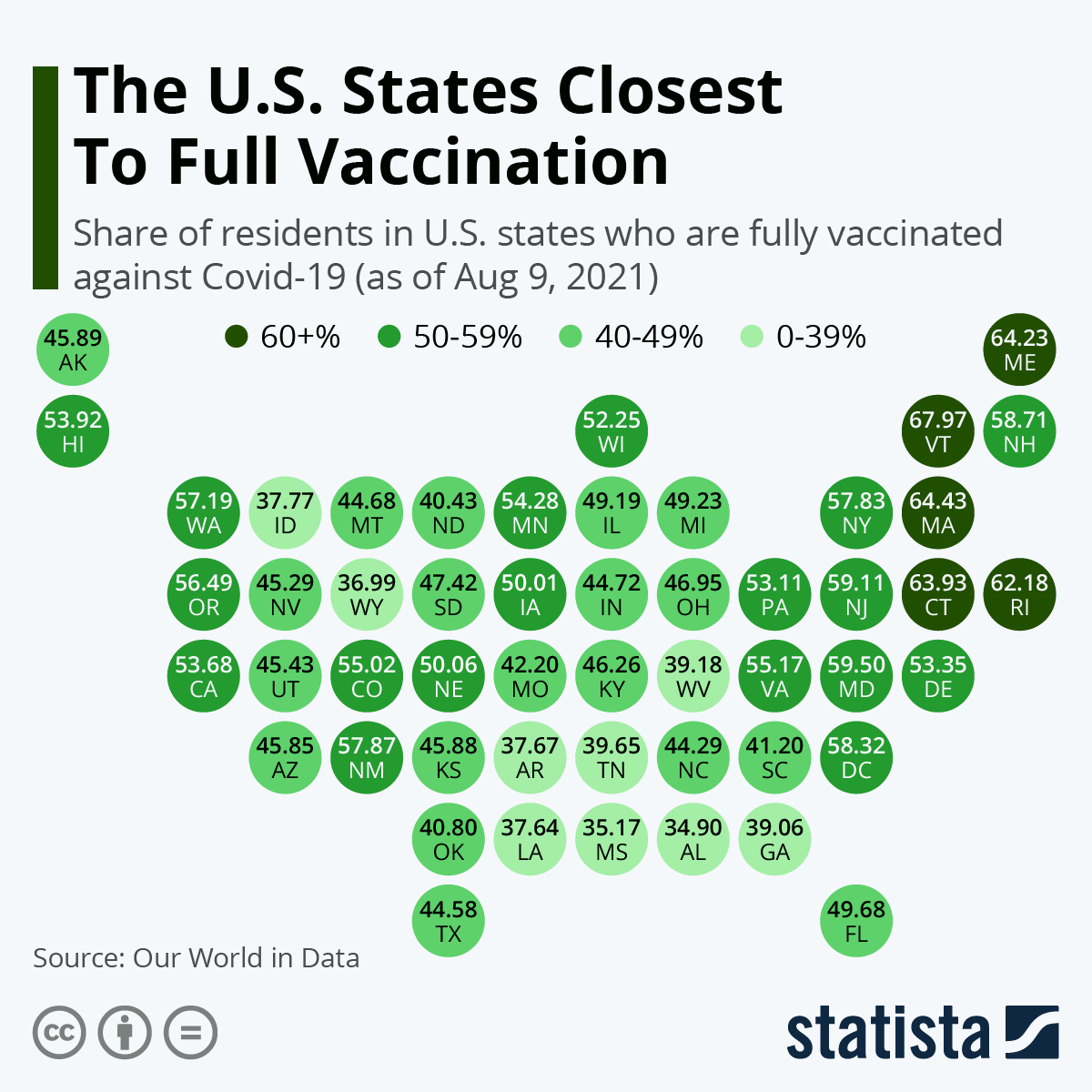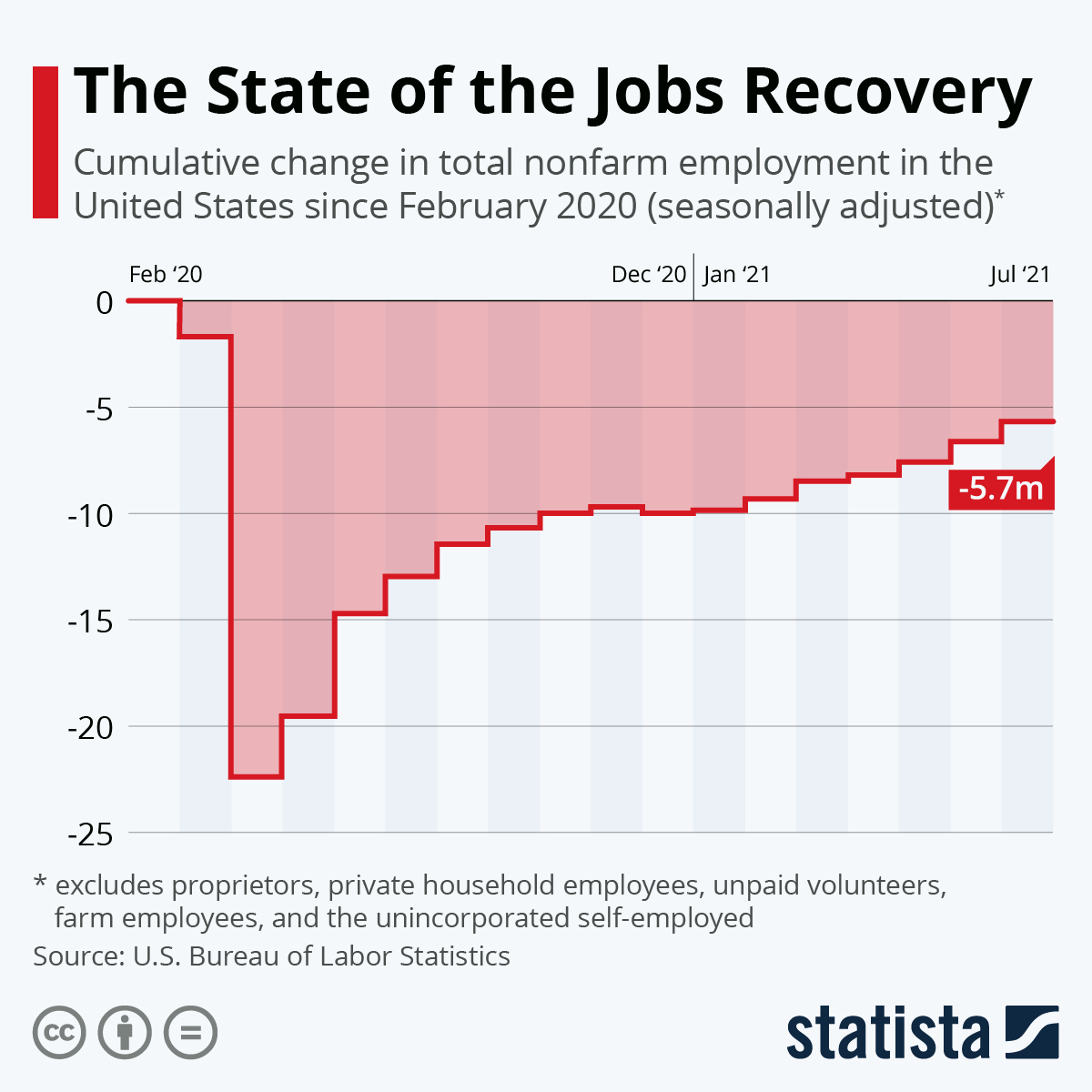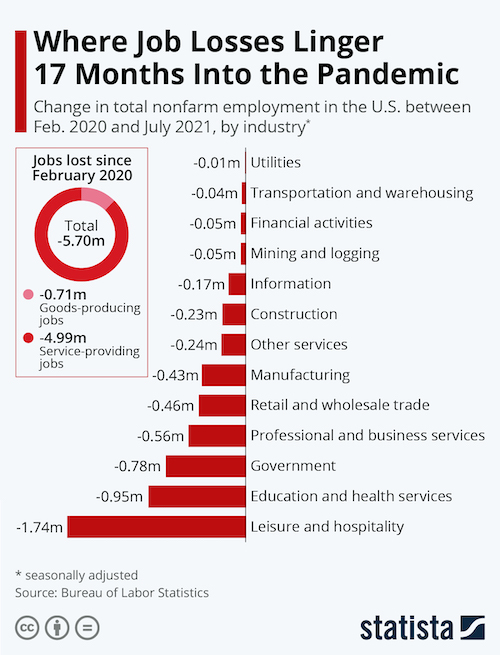COVID-19 Bulletin: August 10
More news relevant to the plastics industry:
Some sources linked are subscription services.
Supply
- Oil prices fell roughly 2.5% Monday, extending last week’s losses for the largest price decline since last October on continued fears of spreading cases of the COVID-19 Delta variant globally. Crude futures recovered in late morning trading today, with WTI up 2.9% at $68.45/bbl and Brent up 2.6% at $70.82/bbl. Natural gas was 0.4% higher at $4.08/MMBtu.
- Saudi Aramco’s daily output could rise by 550,000 bpd in 2025, the expected completion date for expansion projects on two of the nation’s major oil fields.
- Indian officials are considering requiring the nation’s refineries and fertilizer plants to gradually increase their use of green hydrogen, part of an ongoing effort to reduce carbon emissions.
- Our most recent list of force majeure and allocation announcements from suppliers is here.
Supply Chain
- With 107 wildfires burning across 15 U.S. states, weather forecasters are warning of a new heat wave expected to blanket parts of the country this week, particularly in the Pacific Northwest, where temperatures in Portland could rise to 103°F by Friday.
- California’s Dixie Fire, the second-largest in state history, grew to nearly 500,000 acres Sunday with only 21% containment. The fire has nearly doubled in size from last week and will stretch into its 27th day today.
- Southern Oregon’s Bootleg Fire is now 96% contained after burning 413,765 acres.
- The U.S. Senate will vote today on passage of a $1 trillion infrastructure bill, including $550 billion in new spending on roads, bridges and internet access.
- Intermodal volumes rose 20.4% year over year in the second quarter, the largest quarterly gain in more than 10 years, as consumer demand continues to rise along with elevated trucking rates.
- Container freight rates fell by the largest amount in almost five years last week, with the benchmark Freightos Baltic Index (FBX Global) dropping 7.3%.
- Canada’s customs workers reached an agreement with the nation’s Border Services Agency Friday, forestalling a potential strike that threatened supply chains with the U.S.
- Canadian Pacific Railway is expected to raise its bid for Kansas City Southern, North America’s smallest major freight line, as it reignites a months-long bidding war with Canadian National Railway to acquire the carrier.
- Rail equipment manufacturer Wabtec modernized its 1,000th locomotive Friday, a practice that has increased locomotive efficiency by 25% and reduced carbon emissions by more than 1.4 million tonnes.
- Hong Kong-based Orient Overseas Container Line is the first ocean carrier to offer rail-sea service between China and the U.S. East Coast, hoping to avoid congestion caused by high traffic in western ports and the Panama Canal.
- Tech executives are beginning to report significant delivery delays of computer chips for personal items such as phones, laptops and printers, rivaling shortages seen by the automotive industry since last year.
- China-based Semiconductor Manufacturing International is moving ahead with plans to build two new chip fabrication plants in Beijing and Shenzhen despite U.S. trade restrictions, with each facility expected to be operational by 2024.
- Supply chain disruption and recently surging cases of the COVID-19 Delta variant have dampened hopes of what was expected to be a record back-to-school shopping season.
Markets
- The seven-day moving average of U.S. COVID-19 cases rose to 108,600, up 36% from a week ago, as the country reported 184,346 new infections and 492 virus deaths Monday.
- COVID-19 hospitalizations in the U.S. are straining many regional hospital systems and are expected to rise further in coming weeks.
- The governor of Texas requested that hospitals delay elective procedures to free beds for a surge in COVID-19 patients.
- California reported 14,402 new COVID-19 infections Friday, its highest daily total since January.
- Louisiana saw 12,227 new COVID-19 cases over the weekend, its highest weekend total since the start of the pandemic.
- Georgia saw more than 10,000 new COVID-19 cases over the weekend as the state’s positivity rate soared to 16.4%. Public schools in Atlanta have reported more than 1,400 new infections since schools opened last week.
- Mississippi reported 6,912 new COVID-19 infections between last Thursday and Sunday, a tenfold increase since the Fourth of July, with a major state healthcare agency calling for mask mandates for all of the state’s school districts.
- South Carolina reported 3,236 new COVID-19 infections Friday, its highest one-day total since February.
- Arizona has reported more than 2,000 new COVID-19 cases for five straight days.
- Oklahoma ranks sixth in the U.S. for most COVID-19 cases per 100,000 residents and 15th for the highest number of COVID-19 cases per population worldwide.
- With Oklahoma and Kentucky surpassing 500,000 total COVID-19 infections, half of states now have logged over half-a-million infections and 11 states have registered over 1 million.
- Low demand for COVID-19 vaccines in Alabama has forced the state to throw out more than 65,000 doses, as the state’s seven-day average for new infections topped 3,000, largely concentrated in Mobile County.
- Nevada has been labeled “high risk” for COVID-19 by the federal government, as the state’s total virus death count surpassed 6,000 late last week.
- Despite its nearly 65% vaccination rate, Maine’s COVID-19 vaccinations have risen 11.7% since July, a response to surging virus infections fueled by the Delta variant.

- The Pentagon will require all members of the U.S. military to be vaccinated against COVID-19 by Sept. 15.
- California is requiring more than 2 million of the state’s healthcare workers to get vaccinated, with Hawaii implementing a similar measure Monday.
- Florida’s governor intensified the state’s legal battle with cruise operators, appealing a recent court decision allowing Norwegian Cruise Line to require proof of COVID-19 vaccination from passengers.
- Significant numbers of deer in Pennsylvania were found to have COVID-19 antibodies in a recent study, highlighting how the virus’ spread has not been limited to humans.
- BioNTech endorsed repeat “booster” shots of its COVID-19 vaccine over tailoring doses to new virus mutations, as it reached a milestone of supplying more than 1 billion shots worldwide in late July. The company also announced plans to begin testing its novel mRNA technology on cancer.
- U.S. median wage growth increased 4.8% in July, a record pace, with the largest gains concentrated in service workers.

- Unfilled U.S. jobs hit a record-high 590,000 at the end of June, new data shows, surpassing the number of unemployed Americans seeking work and bolstering evidence of a mismatch between where people want to work and which industries are hiring:

- AMC revenue rose 19% in the second quarter on a broad return of moviegoers to its theaters. The company forecasts third-quarter ticket revenue to remain less than half of 2019 levels, however.
International
- Globally, 30.2% of the population has received at least one COVID-19 vaccination shot, with 15.6% fully vaccinated. Only 1.1% of people in low-income countries have received a shot.
- Sydney, Australia, reported 343 new COVID-19 infections Monday, a record, as authorities stepped up enforcement of the region’s strict lockdown now stretching into a seventh week.
- Despite continuing to report the world’s highest daily COVID-19 fatalities, Indonesian officials have begun easing restrictions in several cities including the capital Jakarta.
- Health officials are warning that India could suffer another COVID-19 wave more devastating than its last due to medical supply bottlenecks and a lack of reliable data on infection and fatality counts.
- Almost 20% of hospitals in the Philippines are nearing capacity as the nation’s daily COVID-19 infections have risen to about 10,000 per day.
- France added 111 new COVID-19 patients to ICU wards Monday, the first daily increase over 100 since April, as the country averages more than 22,000 new infections per day. The U.S. issued a “Level 4: Do Not Travel” alert warning against traveling to France.
- Britain reported more than 25,000 new COVID-19 cases Monday, a rise of 5% from the week prior.
- A draft proposal from the German government would require negative COVID-19 tests to access many everyday activities, including indoor dining, religious ceremonies and recreation sports.
- South Korea, facing the worst COVID-19 outbreak of the pandemic, has been forced to delay the period between shots after delivery delays from Moderna left the nation with half the planned number of doses for August.
- Switzerland will begin administering Moderna’s COVID-19 vaccine to children as young as 12.
- The U.S. will boost donations of COVID-19 vaccines to Mexico in the next several days to help the country fight off another wave of COVID-19 infections.
- Israel has inoculated one-third of its population over age 60 with a COVID-19 booster shot, while most recipients report experiencing side effects similar to their second dose.
- Wuhan, China, has completed testing its population of 11.3 million for COVID-19 after the city reported just three local infections of the virus last Monday.
- Singapore says 70% of its population has been fully vaccinated against COVID-19, a milestone, as officials begin to lift restrictions on dining and indoor gathering.
- Canada reopened its land borders with the U.S. Monday to fully vaccinated Americans who can provide a negative COVID-19 test within three days of traveling. Initial evidence suggests the new measures are creating multiple-hour delays at crossings.
- The EU has decided not to reimpose travel restrictions on visitors from the U.S., despite the country’s recent uptick in COVID-19 infections.
- An epidemiologist who previously helped eradicate smallpox called COVID-19 potentially “the most contagious virus” ever and expects cases to continue spreading with only a small percentage of the global population vaccinated.
- French economic activity nearly returned to pre-pandemic levels in July, despite almost 50% of the nation’s companies reporting supply difficulties for the third straight month.
- South Korean electronics maker LG Electronics revised down its quarterly operating profit by 20% due to costs associated with General Motors’ recall of 69,000 Bolt electric vehicles earlier this year.
- French carmaker Renault is looking to develop hybrid electric vehicles with China’s Geely for markets in China and South Korea.
- India is mulling cutting import taxes on electric vehicles to as low as 40% from the current 60%, a move that follows recent lobbying efforts made by Tesla.
Our Operations
- With the recent widespread and rapid spike in COVID-19 infections and hospitalizations in the U.S., M. Holland is scaling back participation in this week’s MD&M West conference. Our first and foremost priority is protecting the health of our Mployees and business partners. While we will maintain a booth presence, we will be canceling our reception and meetings outside the conference.
- M. Holland’s 3D Printing group offers a rapid response alternative for producing selected parts where resin availability is tight during prevailing force majeure. For more information, email our 3D Printing team.
- Market Expertise: M. Holland offers a host of resources to clients, prospects and suppliers across nine strategic markets. To arrange a videoconference or meeting with any of our Market Managers, please visit our website.
Thank you,
M. Holland Company
We will provide further COVID-19 bulletins as circumstances dictate. For all COVID-19 updates and notices, please refer to the M. Holland website.